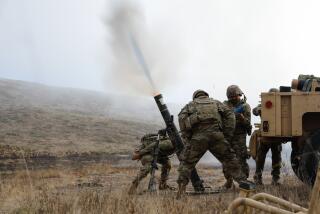Huge Cuts Sought for Point Mugu Base : Military: Pentagon inspector general’s report calls for relocating most of the naval operations. Ventura County leaders warn of impact on the area.
- Share via
VENTURA — A Pentagon report kept hidden from the public for five months recommends shutting down most of the Point Mugu Navy base, eliminating 1,049 military jobs and transferring about 3,000 to other institutions, The Times has learned.
In the 57-page report, the Defense Department’s inspector general concludes that taxpayers could save $1.7 billion over 20 years if the Ventura County base moves most of its missile-testing operations to its sister base at China Lake in the upper Mojave Desert.
Although the report’s accuracy and influence are disputed by Navy officials, it comes at a time when the Pentagon is weighing which bases to offer as sacrifices in next year’s round of nationwide base closures.
“We’re very upset about it,” said Rep. Elton Gallegly (R-Simi Valley), who has joined a special task force of government and business leaders formed to protect Ventura County’s Navy bases.
Gallegly said he has seen only “bits and pieces” of an early draft, but worries what it could mean for the county’s largest employer.
The final report, obtained by The Times, has not been officially released. Gallegly and other members of the task force said they believe the report’s conclusions cannot be used legally by other Pentagon officials in preparing a list of bases to close.
Issued to a small group of Pentagon officials June 8 over the strong objections of the Navy, the report recommends moving most of Point Mugu’s operations and almost 2,000 jobs to the China Lake Navy base, about 150 miles northeast of Los Angeles.
The consolidation, the report said, would “eliminate redundant or duplicative functions” at Point Mugu and China Lake, which both test high-tech weaponry as members of the Naval Air Warfare Center, Weapons Division.
About 100 employees would remain to operate Point Mugu’s airfield. But the report recommends eliminating 1,049 jobs at Point Mugu.
Another 1,083 workers would move to a nearby Navy facility at Port Hueneme so they could continue to operate Point Mugu’s missile test range that spreads across 36,000 square miles of the Pacific Ocean.
The report does not address the 3,000 people who work on base as employees of defense contractors.
Moving costs would run about $518 million, so the inspector general’s auditors do not figure any net savings for the first six years.
The inspector general’s report has been sharply criticized by Navy officials, who said its conclusions and analysis are based on inaccurate data and incorrect assumptions.
For example, the report contends that Navy officials used “a very lenient interpretation” of rules that allowed them to exclude Point Mugu and China Lake from being seriously considered for consolidation in 1993 because of “unique” military features.
But in a memo to the inspector general, Assistant Navy Secretary Nora Slatkin wrote: “All technical centers, including Point Mugu, were evaluated in the course of the 1993 process on the basis of (proper) criteria. No activities were ‘excluded’ from this evaluation because of their unique geographic or mission-related characteristics.”
Slatkin also criticized the inspector general’s office for unfairly singling out a Navy base for closure without considering all military installations as required by the base closure and realignment law.
For that reason, she recommended that the inspector general’s office delete from the report its recommendations to merge Point Mugu into China Lake.
Robert J. Lieberman, the Defense Department’s assistant inspector general for auditing, was the official overseeing the audit recommending Point Mugu’s closure.
He said he stands by the report’s conclusions that the two bases have programs with too much overlap.
And given the Navy’s hostile reaction to the auditors and the report, he said his office has forwarded the recommendations to a higher level: those officials in the Defense secretary’s office who are considering which bases nationwide to consolidate.
“The Navy wasn’t going to use it, that was clear,” Lieberman said.
He added that the inspector general’s staff has a legitimate role in the base closure process because it has been assigned the responsibility of verifying all data submitted by the Navy and other military branches.
In this fourth and final round of base closures, the Defense Department will consider combining bases from different branches of the service. Overall, the secretary of defense has mandated a 15% reduction of the nation’s military bases.
So it is possible that Point Mugu could be merged with Edwards Air Force Base or Vandenberg Air Force Base, or another military installation that tests missiles or other high-tech weaponry.
Some Point Mugu supporters have accused the inspector general’s office of targeting Point Mugu at the behest of a competing Air Force base.
“None of that is true,” Lieberman said. “We initiated it based on our professional judgment. There wasn’t any outside meddling.”
Navy officials say Point Mugu has a unique function in the nation’s military: It is the launching pad to the world’s biggest sea test range, used daily by naval aircraft, ships and submarines in firing missiles and testing weapons.
China Lake is the Navy’s largest base, stretching over 1,700 square miles of desert land--nearly the size of Delaware. China Lake also has 17,000 square miles of airspace restricted to military aircraft and weapons testing.
All three branches of the military are scrutinizing which bases should close. Secretary of Defense William J. Perry is scheduled to release a recommended list in March.
At that point, a federally appointed base closure commission will evaluate the list, hold public hearings and make its decision in July.
More to Read
Sign up for Essential California
The most important California stories and recommendations in your inbox every morning.
You may occasionally receive promotional content from the Los Angeles Times.










